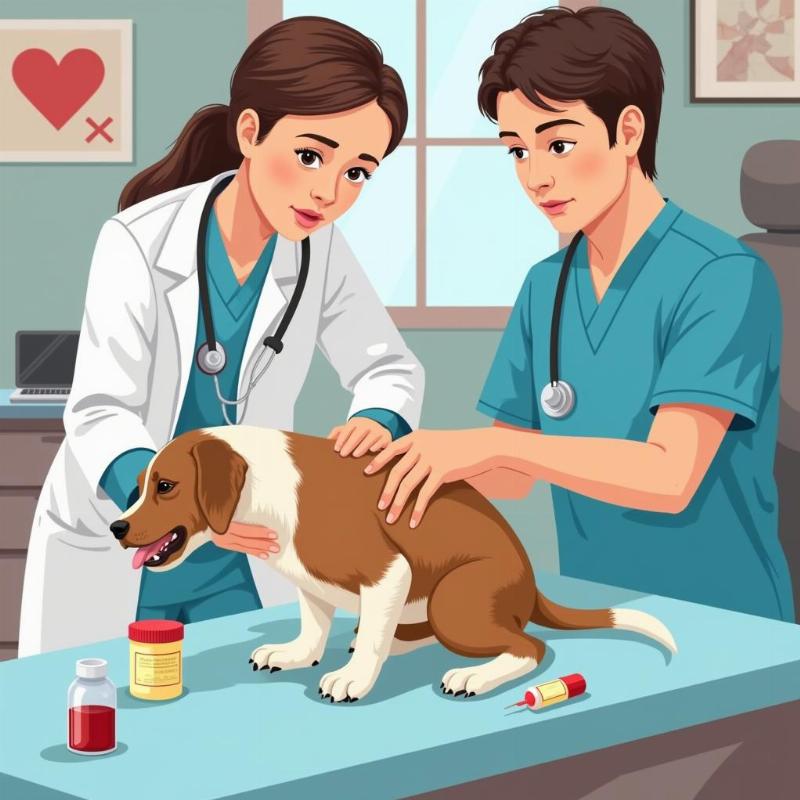Rat poison, a common household item, poses a serious threat to our canine companions. Even just one bite can have devastating consequences, requiring immediate veterinary attention. Understanding the different types of rat poison, the symptoms of poisoning, and the crucial steps to take if your dog ingests it is vital for every dog owner in the United States. This knowledge can be the difference between life and death for your beloved pet.
Understanding the Dangers of Rat Poison for Dogs
Rat poison works by disrupting the blood’s ability to clot, leading to internal bleeding. Different types of rodenticides use different active ingredients, but all can be toxic to dogs. Anticoagulants, such as brodifacoum, are the most common and act by blocking vitamin K, essential for clotting. Even a small amount can cause severe bleeding in dogs. Other types, like bromethalin, cause swelling in the brain and are equally dangerous. The danger of “just one bite” is very real, as even a small amount of certain rodenticides can be lethal for dogs.
Recognizing the Signs of Rat Poisoning in Dogs
Early detection is critical when it comes to rat poisoning. Symptoms can appear anywhere from a few hours to several days after ingestion, depending on the type of poison. Common signs include lethargy, weakness, pale gums, bruising, nosebleeds, bleeding gums, coughing up blood, blood in urine or stool, vomiting, and difficulty breathing. If you suspect your dog has ingested rat poison, even if you haven’t seen them eat it, immediate veterinary care is essential.
What to Do if Your Dog Eats Rat Poison
If you suspect your dog has ingested rat poison, time is of the essence. Immediately contact your veterinarian or the ASPCA Animal Poison Control Center (APCC) at (888) 426-4435. They can provide expert advice based on your dog’s breed, size, and the type of poison ingested. Having the container of rat poison on hand will help your veterinarian determine the best course of action. Inducing vomiting may be recommended, but only under the guidance of a veterinarian. Never try to induce vomiting yourself unless specifically instructed to do so.
 Veterinarian examining a dog for rat poison ingestion
Veterinarian examining a dog for rat poison ingestion
Preventing Rat Poison Exposure in Dogs
The best way to protect your dog from rat poison is to prevent exposure altogether. Store all rodenticides in secure locations out of your dog’s reach, such as locked cabinets or high shelves. Consider using pet-safe rodent control methods, such as traps or deterrents. When walking your dog, be vigilant and prevent them from scavenging in areas where rat poison might be present. Regularly inspect your home and yard for any signs of rodent activity or misplaced bait.
Long-Term Effects and Recovery from Rat Poisoning
The long-term effects of rat poisoning can vary depending on the severity of the exposure and the type of poison ingested. Some dogs may require long-term vitamin K therapy to help their blood clot properly. Regular blood tests are necessary to monitor clotting factors. With prompt and appropriate treatment, many dogs can recover fully from rat poison ingestion. However, severe cases can lead to permanent organ damage or even death.
Conclusion
Rat poison, even in small amounts, is a serious threat to dogs. Understanding the risks, recognizing the symptoms, and taking swift action are crucial for protecting your furry friend. By taking preventative measures and seeking immediate veterinary care if ingestion is suspected, you can significantly increase your dog’s chances of a full recovery. “Just one bite” can have devastating consequences, so vigilance and proactive measures are essential for responsible dog ownership.
FAQ
- What should I do if I see my dog eat rat poison? Immediately contact your veterinarian or the ASPCA Animal Poison Control Center.
- What are the signs of rat poison poisoning in dogs? Lethargy, weakness, pale gums, bruising, nosebleeds, bleeding gums, blood in urine or stool, vomiting, difficulty breathing.
- Can rat poison kill a dog? Yes, even a small amount of certain rodenticides can be lethal.
- How is rat poisoning treated in dogs? Treatment may include inducing vomiting, administering activated charcoal, and vitamin K therapy.
- How can I prevent my dog from eating rat poison? Store rodenticides securely, use pet-safe rodent control, and supervise your dog outdoors.
- Are there any long-term effects of rat poisoning in dogs? Some dogs may require long-term vitamin K therapy and regular blood monitoring.
- What is the best way to get rid of rats without harming my dog? Consider using pet-safe traps or deterrents.
Related Articles:
- turkey corn dogs trader joe's
- are raw chicken gizzards good for dogs
- boar's head all beef hot dogs
- can dogs have beef stew
Beautdogs.us is your trusted online resource for comprehensive and engaging information on dog breeds, care, and products. We offer expert advice for both new and experienced dog owners. Contact us for personalized guidance: Email: [email protected], Phone: +1 501-555-7529. Visit Beautdogs.us for more expert advice on all things dog-related!